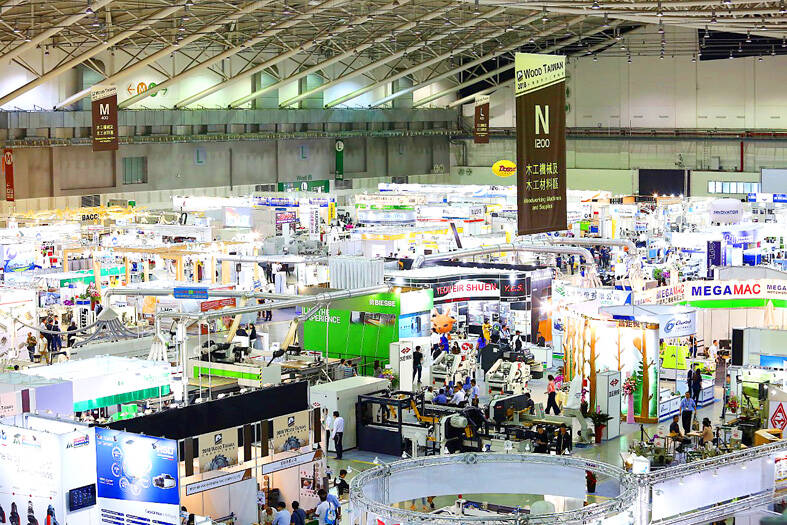The nation’s industrial production contracted for a seventh month last month, down 14.52 percent annually, due to persistent weakness in demand for semiconductors, flat panels and other components amid prolonged inventory digestion, the Ministry of Economic Affairs said yesterday.
Industrial production in the first quarter declined 14.52 percent, while manufacturing production dipped 15.39 percent from a year earlier, with most sub-indices posting double-digit percent drops, ministry statistics showed.
Traditional industries, such as petrochemicals and basic metal sectors, have passed the trough and picked up steam last month, while the chip sector showed continued weakness in demand due to inventory corrections, the ministry said.

Photo courtesy of the Taiwan External Trade Development Council
“The ministry’s inventory report to be released next month shows a positive trend, with inventory at local firms improving gradually month-on-month, Department of Statistics Deputy Director-General Huang Wei-jie (黃偉傑) said.
“However, on an annual basis, inventory continues to rise, indicating there is still a long way to go before returning to healthier levels, especially on the semiconductor front,” he added.
“Overall, the visibility for the second quarter is low,” Huang said. “The end-market demand continues to be depressed by unfavorable macroeconomic conditions and excessive stockpiles.”
Manufacturing production this month is expected to dip further to between 108.60 and 112.60, or an annual rate of 16 percent to 18.9 percent, Huang said, citing a ministry survey in which only 10 percent of respondents expected business to grow this month.
Manufacturing production last month beat ministry expectations of an annual contraction of 19.1 percent. The computer and optical component sectors performed better than expected by gaining 0.15 percent annually last month due to robust demand for servers and networking devices, Huang said.
“The growth was aided by a major shift in supply chains that occurred as a result of a trade dispute between the US and China. Taiwanese manufacturers are benefiting from such shifts,” Huang said.
“Some Taiwanese manufacturers have shifted production back home to cope with such changes,” he added.
The automotive segment also outperformed expectations last month, with vehicle and component production rising 1.84 percent from a year earlier due to alleviation in supply constraints.
Decline in the production of electronic components accelerated to 22 percent year-on-year last month from a reduction of 18.74 percent in February. Within the sub-index, chip production sank 18.87 percent and flat panel production plummeted 43.79 percent on an annual basis.
The petrochemical sector saw production drop 12.2 percent year-on-year last month, the smallest decline in nine months, showing the segment moving in a positive direction as inventory correction approaches an end, the ministry said.
The basic metals segment also showed improvement, with production last month falling 14.23 percent annually, the ministry said.
Machinery tool output contracted 21.91 percent year-on-year last month, as global economic uncertainty resulted in conservative capacity expansion investment.

Semiconductor business between Taiwan and the US is a “win-win” model for both sides given the high level of complementarity, the government said yesterday responding to tariff threats from US President Donald Trump. Home to the world’s largest contract chipmaker, Taiwan Semiconductor Manufacturing Co (TSMC, 台積電), Taiwan is a key link in the global technology supply chain for companies such as Apple Inc and Nvidia Corp. Trump said on Monday he plans to impose tariffs on imported chips, pharmaceuticals and steel in an effort to get the producers to make them in the US. “Taiwan and the US semiconductor and other technology industries

A start-up in Mexico is trying to help get a handle on one coastal city’s plastic waste problem by converting it into gasoline, diesel and other fuels. With less than 10 percent of the world’s plastics being recycled, Petgas’ idea is that rather than letting discarded plastic become waste, it can become productive again as fuel. Petgas developed a machine in the port city of Boca del Rio that uses pyrolysis, a thermodynamic process that heats plastics in the absence of oxygen, breaking it down to produce gasoline, diesel, kerosene, paraffin and coke. Petgas chief technology officer Carlos Parraguirre Diaz said that in

CHIP WAR: Tariffs on Taiwanese chips would prompt companies to move their factories, but not necessarily to the US, unleashing a ‘global cross-sector tariff war’ US President Donald Trump would “shoot himself in the foot” if he follows through on his recent pledge to impose higher tariffs on Taiwanese and other foreign semiconductors entering the US, analysts said. Trump’s plans to raise tariffs on chips manufactured in Taiwan to as high as 100 percent would backfire, macroeconomist Henry Wu (吳嘉隆) said. He would “shoot himself in the foot,” Wu said on Saturday, as such economic measures would lead Taiwanese chip suppliers to pass on additional costs to their US clients and consumers, and ultimately cause another wave of inflation. Trump has claimed that Taiwan took up to

SUBSIDIES: The nominee for commerce secretary indicated the Trump administration wants to put its stamp on the plan, but not unravel it entirely US President Donald Trump’s pick to lead the agency in charge of a US$52 billion semiconductor subsidy program declined to give it unqualified support, raising questions about the disbursement of funds to companies like Intel Corp and Taiwan Semiconductor Manufacturing Co (台積電). “I can’t say that I can honor something I haven’t read,” Howard Lutnick, Trump’s nominee for commerce secretary, said of the binding CHIPS and Science Act awards in a confirmation hearing on Wednesday. “To the extent monies have been disbursed, I would commit to rigorously enforcing documents that have been signed by those companies to make sure we get